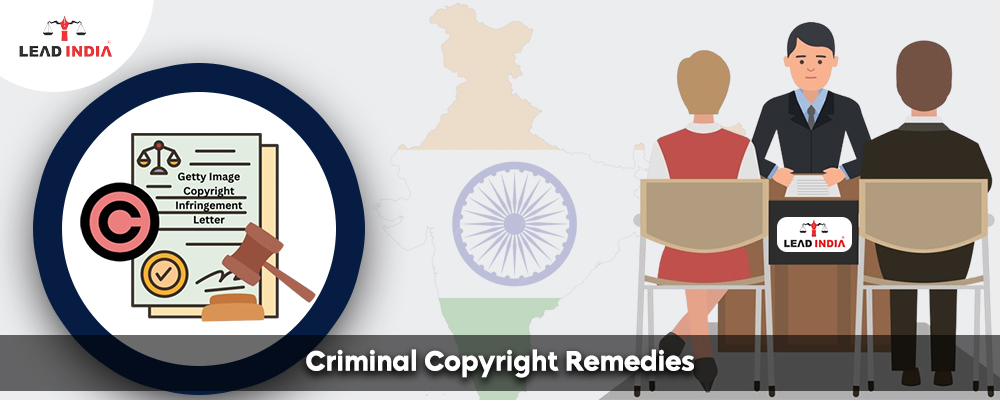Regarding intellectual property rights, copyright infringement is a major issue that harms artists’ and creators’ reputations. For this reason, it is crucial for copyright owners to comprehend and investigate the range of legal remedies available to prevent such infringement. A few of these remedies are accounts of profits, damages, and injunctions.
Having a thorough understanding of the enforcement procedures can enable creative professionals, such as writers, filmmakers, or musicians, to safeguard their works and effectively counteract instances of copyright infringement.
Copyright Infringement: Instances
The following situations constitute copyright infringement in India, according to the Copyright Act, 1957:
- Unauthorized copies of copyrighted works are made for sale or hire; this includes online piracy.
- Distributing illegal copies is done for financial and commercial benefit.
- Work protected by copyright is presented in public.
- India imports counterfeit copies.
- Public display of illegal copies that harm the owner
- replication of a musical, dramatic, literary, or artistic work that isn’t a cinematograph film
- the process of turning the copyrighted sound recording into a recording
- A replica of the cinematographic picture
Need A Legal Advice
The internet is not a lawyer and neither are you. Talk to a real lawyer about your legal issue

What are the Criminal Copyright Remedies?
The Indian Copyright Act, 1957 covers the criminal consequences for copyright infringement under Sections 63-70. Legal actions taken in a criminal court to remedy infractions of criminal law are referred to as criminal procedures. Criminal proceedings in the context of copyright infringement entail the prosecution of persons or organizations who have violated copyright as a crime. Usually, this entails the government or state filing charges against the party that is infringing, who may be subject to fines and/or jail if found guilty.
- Imprisonment for a minimum of six months and a maximum of three years as a form of punishment
- Penalties that may reach up to Rs. 200,000 and that must not be less than Rs. 50,000
- Delivery of plates or copies that are illegal to the owner of the copyright.
- The items that are considered to be infringing may be searched for and seized, including plates, which are described as any equipment, blocks, molds, transfers, negatives, duplicating apparatus, or other item that is used or intended to be used in the printing or creation of replicas of the work.
According to the statute of limitations, the deadline for filing a claim for copyright infringement is three years from the date of the infringement. In cases where the basis for bringing a copyright infringement lawsuit is recurrent or continuous, the three-year statute of limitations would be considered to have started on the date of the most recent infringement.
Copyright Infringement Cases: Landmark Decisions
1. Twentieth Century Fox vs Sohail Maklai Entertainment Ltd.
Background of the Case
- The producers of “Knock Out” were charged by Twentieth Century Fox in 2010 with violating the copyright of their movie “Phone Booth.”
- The creators of “Phone Booth” filed a lawsuit, claiming infringement of copyright and requesting an injunction.
Decision by the Court
- The Bombay High Court decided that the “idea” of a guy kept captive in a phone booth was original and protected by copyright. “Knock Out” had similar moments in both movies that suggested copyright violation.
- Fox Studios received a settlement payment of ₹1.25 crores from Sohail Maklai Entertainment.
2. The Case of Najma Heptulla vs Orient Longman Ltd
Background of the Case
- The petitioner, who is Maulana Abdul Kalam Azad’s legal heir, gave Prof. Humanyun Kabir permission to translate and narrate Azad’s works.
- The plaintiff gave the publisher rights and agreed to pay a 50% royalty for 30 years.
Decision by the Court
- The publisher was granted permission by the court to release the book after the period concluded.
- The plaintiff was unable to stop publication once the copyright period had passed.
The aforementioned range of criminal penalties and remedies demonstrates the indispensability of copyright as well as the numerous strategies available for preventing copyright infringement. Thus, the Indian Copyright Act 1957 addresses a number of clauses that guard against situations where a violation may occur and resolve a wide range of possible legal problems should they arise.
One can talk to lawyers from Lead India for any kind of legal support. In India, free legal advice online can be obtained at Lead India. Along with receiving free legal advice online, one can also ask questions to the experts online free through Lead India.





 Talk to a Lawyer
Talk to a Lawyer